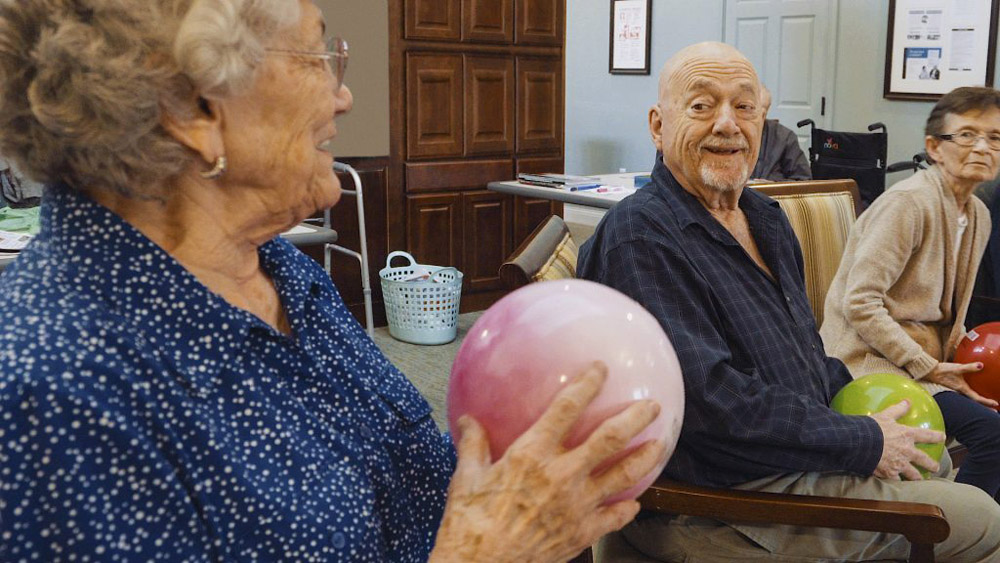Daily Life in an Alzheimer’s Care Community
Discover Compassionate Memory Care: Enhancing Lifestyle for Loved Ones
The journey of taking care of a liked one with cognitive disabilities offers distinct obstacles that can profoundly affect household characteristics and emotional well-being. Compassionate memory care centers offer an organized, supportive setting created to attend to these challenges while enhancing the lifestyle for homeowners. By concentrating on customized care and meaningful involvement, these centers not only boost those influenced by conditions like Alzheimer's and dementia yet additionally supply comfort for households. As we explore the crucial components of caring memory care, it comes to be clear that recognizing these options can make a considerable distinction in the lives of all entailed.

Comprehending Memory Care
Recognizing memory care includes acknowledging the customized assistance and services made to aid people with cognitive problems, such as Alzheimer's illness and other types of dementia. Memory care facilities concentrate on producing a risk-free and organized setting that promotes the health of citizens while addressing their special cognitive challenges.Key parts of memory care include trained personnel who are educated about the complexities of mental deterioration and relevant disorders. These experts employ evidence-based practices to improve cognitive function and maintain dignity through individualized care plans. The physical environment is also customized to lessen confusion and advertise experience, often including secure areas to avoid wandering. Memory Care Charlotte.Moreover, memory care highlights social engagement and purposeful activities that stimulate cognitive capabilities and foster connections among residents. This strategy recognizes the relevance of keeping social interactions to deal with isolation usually experienced by individuals with memory loss.Families play a crucial duty in memory care, as their participation aids develop a supportive network that improves the lives of locals. By recognizing the customized nature of memory care, families can make enlightened decisions to improve the quality of life for their enjoyed ones dealing with cognitive problems
Key Functions of Compassionate Care
Compassionate care in memory care setups is defined by an all natural technique that focuses on the psychological and emotional well-being of homeowners. Key functions of this approach consist of embellished care strategies customized to every citizen's unique requirements, preferences, and biography. This personalization promotes a feeling of identity and belonging, which is essential for those experiencing cognitive decline.Another important attribute is the existence of skilled personnel that are not only knowledgeable in dementia care however additionally thoughtful and compassionate. These caregivers take part in meaningful communications, utilizing methods such as validation treatment to get in touch with homeowners and reduce sensations of aggravation or anxiety.Additionally, compassionate care settings prioritize sensory stimulation and therapeutic activities that resonate with citizens' passions. This may include art therapy, music sessions, and reminiscence tasks, all made to enhance cognitive feature and psychological connection.Furthermore, household involvement is urged, permitting loved ones to take part in care activities and sustain their family members member's emotional needs. Ultimately, the key attributes of compassionate care produce an atmosphere where citizens feel safe, valued, and understood, considerably enhancing their quality of life.
Benefits for Homeowners and Households

Tasks That Foster Engagement
Meaningful activities play a necessary function in cultivating involvement amongst homeowners in memory care settings. These tasks not just stimulate cognitive function however additionally promote social interaction, psychological well-being, and a feeling of objective. Customized programs that take into consideration residents' interests and capabilities are very important for making best use of participation and enjoyment.Creative pursuits, such as painting, crafting, or songs therapy, urge self-expression and can evoke positive memories. Structured workout sessions, consisting of chair yoga exercise or strolling teams, boost physical health while offering opportunities for socializing. Furthermore, reminiscence therapy, which includes going over previous experiences and notable life occasions, can strengthen links between homeowners and caregivers.Incorporating interactive video games, problems, and even horticulture can better boost cognitive involvement and foster synergy among residents. Routinely scheduled team tasks, such as flick evenings or themed celebrations, create a feeling of community, permitting citizens to construct relationships and share experiences.Ultimately, the execution of diverse activities customized to private preferences is essential in memory care. By advertising engagement via meaningful shows, facilities can significantly improve the quality of life for locals, guaranteeing they feel valued and connected within their neighborhood.
Choosing the Right Memory Care Facility
Selecting a memory care center entails cautious consideration of numerous variables that impact see the health of residents. Begin by reviewing the facility's general setting, making sure it is secure, welcoming, and created to lower confusion. Try to find spaces that motivate social communication while providing privacy for individual reflection.Next, assess the credentials and training of the personnel. Taking care of people with memory impairments needs specialized expertise. Validate that personnel get recurring training in dementia care and employ caring interaction techniques.Additionally, think about the series of solutions supplied, such as individualized care plans, restorative tasks, and assistance for relative. A center that emphasizes holistic care can significantly boost the lifestyle for residents.Visit prospective centers to observe communications in between team and residents, and inquire about their method to engaging those with memory difficulties. Inspect evaluations and look for recommendations from healthcare professionals or local support groups.Lastly, consider the center's area and access for family members visits, as regular contact can boost homeowners' emotional well-being. By taking these factors into account, you can make a well-informed choice that ideal supports your loved one's needs.
Regularly Asked Inquiries
What Credentials Do Memory Care Personnel Usually Possess?
Memory care staff typically hold credentials that consist of specialized training in dementia and Alzheimer's care, as well as qualifications in emergency treatment and CPR. Several have histories in nursing or community service, providing them with crucial skills in patient analysis and emotional assistance. Alzheimer’s Care. In addition, continuous education in behavior management strategies and communication strategies is usual, making sure team stay proficient at resolving the special needs of people with cognitive impairments while cultivating a supportive setting
How Can Family Members Join Their Loved One's Care?

What Is the Expense Range for Memory Care Services?
The expense range for memory care services can vary considerably based on factors such as place, facility features, and degree of care called for. Generally, families might anticipate to pay between $4,000 and $8,000 each month. Extra services, specialized programs, and exclusive holiday accommodations can additionally influence rates. Alzheimer’s Care. It is a good idea for family members to completely research and visit centers to understand what is consisted of in the charges and explore monetary support alternatives offered
Exist Certain Dietary Options Available for Residents?
Yes, several memory care facilities use tailored nutritional options to fulfill the particular dietary needs of citizens. These options commonly take into account numerous dietary limitations, such as diabetes, heart health and wellness, or allergic reactions. Facilities frequently use qualified dietitians to produce dish plans that advertise total well-being while taking into consideration individual preferences. In addition, member of the family are normally urged to join discussions pertaining to dietary options to ensure that their enjoyed ones' tastes and demands are appreciated.
Just How Are Emergencies Dealt With in Memory Care Facilities?
Emergency situations in memory care centers are managed through established methods developed to ensure resident security and speedy response. Staff are trained in emergency procedures, consisting of emergency treatment and discharge strategies - Memory Care Charlotte. Facilities conduct routine drills to prepare for various situations, such as clinical emergency situations, fires, or all-natural calamities. Additionally, communication systems are in location to alert personnel and emergency situation solutions without delay, ensuring that locals get instant focus and care throughout critical situations